Bull sharks and crocodiles are some of the most fearsome creatures in the water! As far as humans go, any sign of either sharks or crocs in the water is enough to keep us far, far away. However, when it comes to comparing sharks and crocodiles, which one is the most fearsome predator in the water? Today, we are going to be taking a look at exactly that! Let’s see who would win in a battle to the death; Bull Shark vs Crocodile: Fight. Let’s get started!
Setting Up the Fight
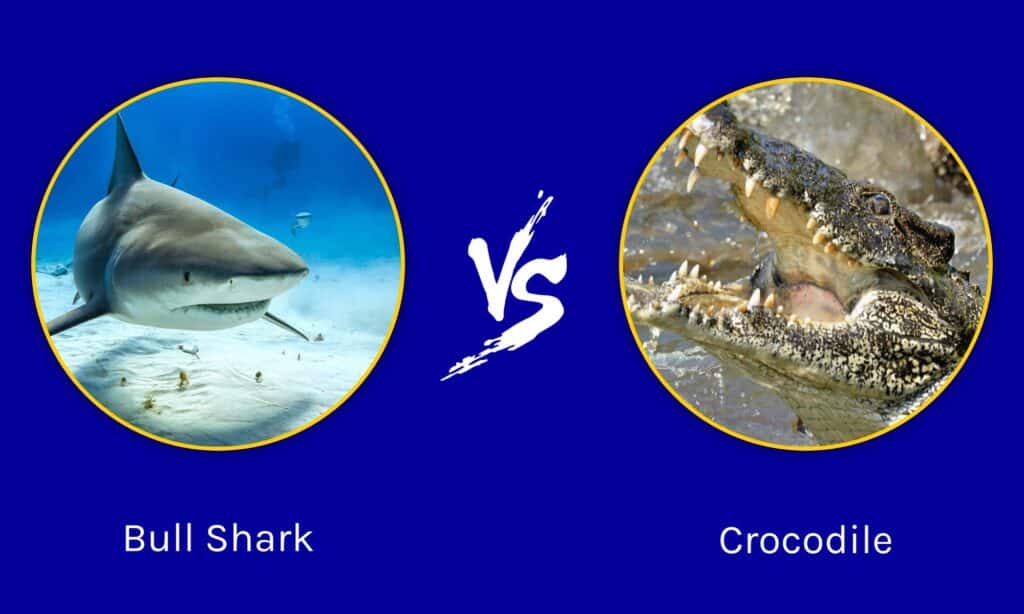
| Bull shark | Crocodile | |
|---|---|---|
| Size | Length: 7-11.5 feet Weight: 200-500 lbs | Length: 9-23 feet Weight: Up to 2,200 lbs |
| Teeth and bite force | Teeth: 350 teeth, razor sharp and serrated Bite force: 1,350 psi | Teeth: Long and pointy, no serration Bite force: 3,700 lbs |
| Water agility | Sustained 25 mph. Can breathe underwater. | Bursts of 25 mph. Can’t breathe water. |
| Defenses | Cartilaginous skin and no bones. | Thick, armored skin. |
| Special adaptations | Electromagnetic sensing. Incredible sense of smell. | Nictitating eye membranes (to see underwater). |
Before we get down into the actual showdown, it’s important to set up the fight! As different as these two creatures are, it’s possible that they would encounter one another in the wild. The American crocodile, for example, is regularly found in coastal regions, including saltwater. As such, they are often recorded traveling in the ocean. Bull sharks are also found around coastal regions, including brackish water and ocean environments. Sharing a habitat, these two were bound to meet. In fact, there are documented cases of these two creatures passing in the wild!
Here are some of the guidelines for the fight:
- It will occur in 25 feet of water. This is a reasonable average for coastal water depth.
- Neither animal will know the other is there immediately.
- It’s to the death!
- We will assume the fight happens 10 times in order to give odds.
Let’s compare some of their features.
Bull Shark vs Crocodile: Size

When it comes to size, it’s a game of averages. On average, bull sharks measure 7-11.5 feet long and weigh 200-500 lbs. There are larger examples, but the most commonly seen examples in the wild fall within this range.
The American crocodile is among the largest of all crocodiles but is still smaller than the Nile and saltwater crocodiles. On average, American crocodiles measure 9-13 feet long (although some reach 20 feet long) and weigh around 880 lbs.
Although both of these animals are large, the American crocodile is, on average, a larger and likely more powerful creature.
Bull Shark vs Crocodile: Teeth and bite force
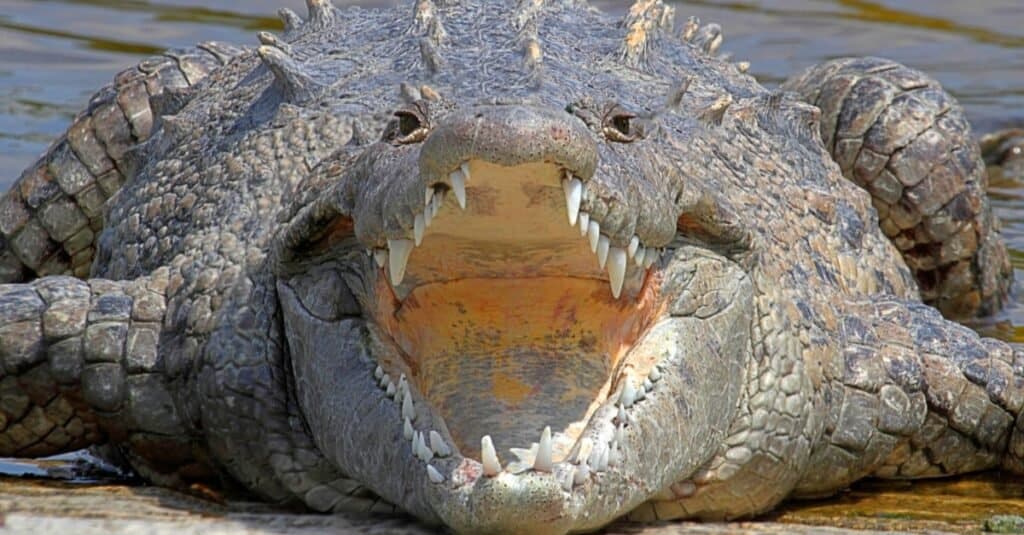
Crocodiles have some of the strongest bite forces in all of the world.
©iStock.com/SteveByland
Like all sharks, bull sharks have mouths that are full of deadly teeth. Generally, bull sharks have 350 teeth at any given moment (they replace themselves with sharper ones constantly). Additionally, these teeth are sharp and serrated, perfect for cutting through flesh and ripping away chunks. The bite force of a bull shark measures around 1,350 psi, all concentrated on the tips of the teeth.
It’s no mystery that crocodiles have some of the strongest jaws on the planet. American crocodiles have a mouth full of teeth; only theirs are pointy and long, better for grabbing than for tearing. Additionally, American crocodiles have some of the strongest jaws on the planet, with measurements placing them at 3,700 psi.
The teeth of the bull shark are sharper and can inflict more damage, but the bite force of the crocodile is much stronger. This category is a tie.
Bull Shark vs Crocodile: Water agility
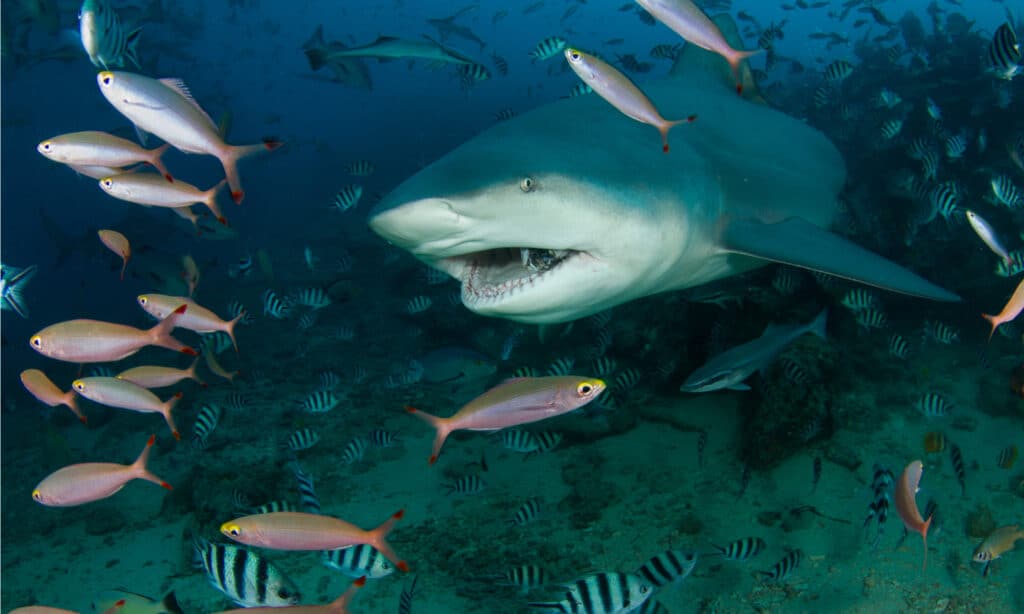
Bull sharks evolved to live and swim in the water.
©chatchai kusolsinchai/Shutterstock.com
All sharks are fish, and the bull shark is no different. These sharks live their entire lives as apex predators in the ocean and are fully adapted for aquatic life. They have fins for cutting through the water, gills for breathing, and a strong tail that can propel them at speeds of around 25 mph for long periods.
Although crocodiles live a large portion of their lives in the water, they aren’t fish and can’t breathe underwater. Still, they have strong tails that can propel them up to 25 mph in bursts and can hold their breath for minutes at a time.
The bull shark is much more agile in an aquatic environment as it can breathe water and swim faster and longer than a croc.
Bull Shark vs Crocodile: Defenses

All crocodiles have thick, armored skin that is extremely hard to penetrate.
©Rudi Hulshof/Shutterstock.com
Bull sharks are cartilaginous fish, meaning they don’t have bones. Instead, they have tough skin and rubbery flesh that can take a ton of damage. Many sharks have skin up to 6 inches thick.
Crocodiles are covered in thick armored plating that resembles ancient chainmail. This armor is extremely effective, although it doesn’t cover its underside.
The crocodile’s skin is thicker and can take more damage, provided damage comes from above.
Bull Shark vs Crocodile: Special adaptations
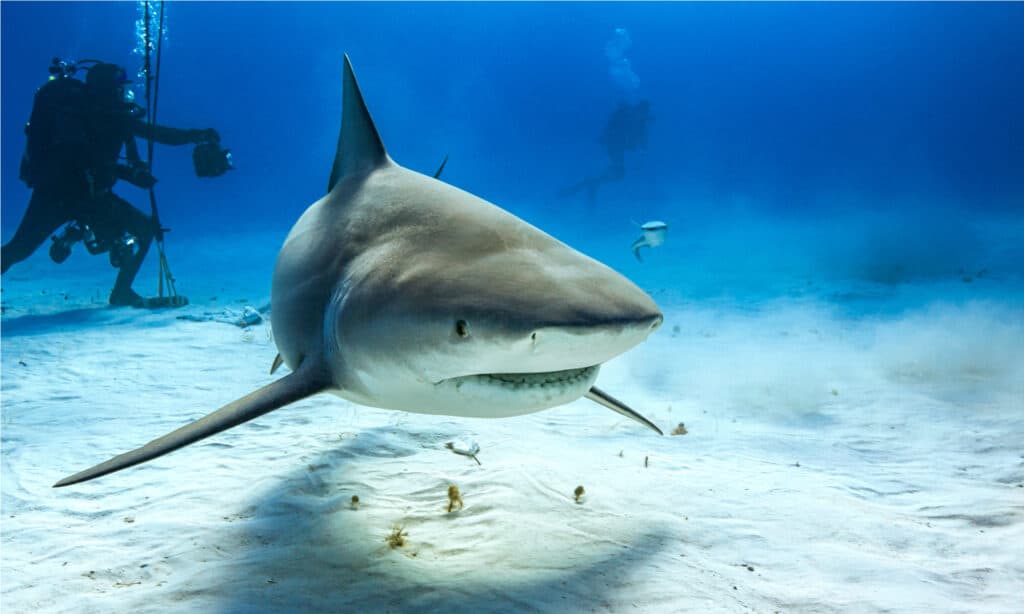
Bull sharks can sense electromagnetic fields, allowing them to hunt in total darkness if needed.
©Carlos Grillo/Shutterstock.com
The bull shark is an apex predator with a few key adaptations that help it find prey. First, bull sharks can sense electromagnetic currents, even in water with zero visibility. All living creatures emit EM currents, allowing a bull shark to hunt in total darkness or mud. Additionally, bull sharks have an amazing sense of smell that allows them to locate injured prey.
Crocodiles are amazing ambush predators that can stay stationary for days at a time, but in a fight, this adaptation isn’t all that useful. One special adaptation that crocodiles have is their nictitating eye membranes. These membranes cover the eyes and allow for clear underwater vision.
The bull shark has better special adaptations for fighting in water, although the crocodile has better adaptations for long-term survival. The bull shark wins.
Bull Shark vs Crocodile: Results
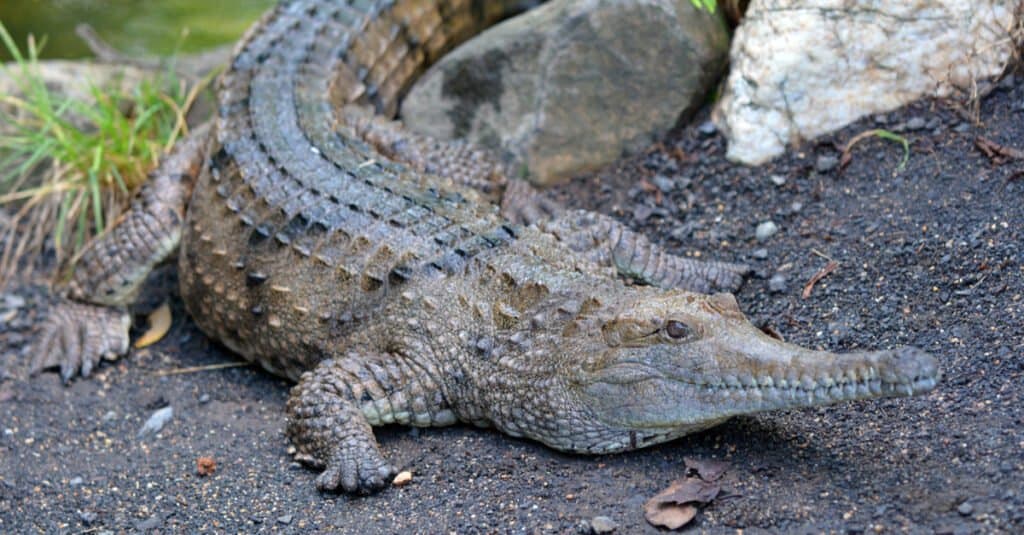
We predict that the crocodile would win in 6 out of 10 encounters with a bull shark.
©ChameleonsEye/Shutterstock.com
Overall, the battle between these two creatures would be absolutely insane! We predict that if a bull shark were to meet an American crocodile in the open water, the crocodile would win 6 out of 10 times.
The reason that this battle is so close is primarily due to size. The American crocodile has a significant size advantage over the bull shark, making it tough for the shark to perform a takedown on a full-grown crocodile. Even more, the shark would have to specifically target the underbelly of the crocodile to cause real damage. Any attacks that didn’t hit the underbelly would cause damage, but nothing fatal.
We think that the shark will almost always have the element of surprise and would be able to strike first every time. The electromagnetic sensing and deep-water swimming would certainly give the shark the advantage early. In the 4/10 the shark wins, it would likely have inflicted a deadly blow on the underbelly of the crocodile, and the crocodile would have bled out.
Once the initial ambush was over, the crocodile would only need to get a single grab on the shark to kill it. In fact, the habit that crocs use when attacking, known as the “death roll,” would flip the shark over, instantly paralyzing it. When sharks are flipped over, they enter a state of tonic immobility, and the fight would instantly be over.
What do you think?
Final results: American crocodile wins 6/10 times
The photo featured at the top of this post is © PomInOz/Shutterstock.com
Thank you for reading! Have some feedback for us? Contact the AZ Animals editorial team.







